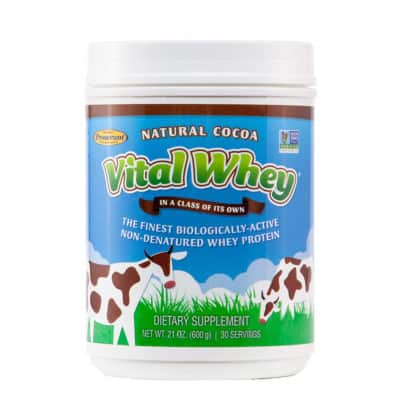
You know you need to refuel after a tough workout, but you may be wondering what to eat after cardio. Is protein necessary after a run or other sweaty workout, since technically the focus is not to build muscle?
Cardio exercise requires the right fuel, but the main purpose is slightly different than strength-training workouts. Cardiovascular exercise helps burn calories and support heart health. As with most vigorous exercise, cardio will cause you to lose water and electrolytes through sweat. It will break down muscle tissue and deplete glucose and other nutrients your body needs to fuel your workout. This is why it’s so important to provide your body with the nutrients necessary (pre and post workout) to support your cardio workout as well.
Protein supplements are frequently recommended to provide fuel for muscle building after a strength-training workout. But, is whey protein strictly for strength exercise or is it beneficial to have a whey protein before cardio or after cardio as well?
What to Eat After a Cardio Workout?
Water and electrolytes, like chloride and sodium, are lost through sweat. These need to be replaced as well. But, don’t invest in fancy sports drinks because after a normal workout, most people don’t need them. Unless it is extremely hot or you are exercising for longer than an hour, plain water works fine and a normal meal after your workout will be more than enough to replenish water and electrolytes.
When it comes to protein and cardio, it’s best to take your protein after the fact because it can be hard to digest prior. Protein before cardio is not recommended. In order to reap the full benefits from whey protein, it’s best to consume whey protein after cardio, within thirty minutes to an hour.
The body needs all nine essential amino acids to rebuild muscle, but the branched-chain amino acids are the most useful. Whey protein is high in branched-chain amino acids to support muscle growth. Whey also has antioxidant properties that may help speed up recovery.3 When you take your whey protein shake after cardio, your body will immediately put it to good use repairing your muscles.

Whey protein is also fast absorbing, so it’s perfect for quick recovery. This makes it ideal for athletes like marathon runners who are undergoing intense cardio training. In fact, many top runners drink a whey protein shake after each run in order to repair their muscles, decrease soreness and provide them with higher energy levels.
To sum it up for what to eat after cardio for optimal recovery, whey protein should be paired with a source of carbohydrates. Also drink plenty of water to stay hydrated. When it comes to cardio workouts, a whey protein shake made with fruit for carbohydrates and electrolytes can be the ideal post exercise treat. For example, combine whey protein with strawberries and yogurt for an ideal post-workout snack that includes both carbohydrates and protein.
Do You Need a Whey Protein Shake After Cardio?
Today, many people who exercise use a whey protein supplement because of the positive effect it can have on the body. Whey protein is sourced from high-quality cow’s milk and uses a gentle processing to separate the liquid in order to maintain the integrity of the proteins. The protein is then filtered and spray dried to create a protein powder that can then be blended into shakes and smoothies. Whey protein has been consistently proven as the best type of protein to build muscle and speed up recovery after exercise.1
Why whey protein?
Whey protein powder is a popular choice for supporting any type of physical activity. It is typically blended into a shake, and will help to replenish the liquids lost during your workout. It will also speed up the muscle recovery process.
A 2011 study evaluated the use of post-cardio carbohydrate and protein supplementation on the recovery and long-term exercise endurance of cyclists. The cyclists received chocolate milk (carbs + protein), carbohydrates alone or a placebo supplement immediately after a 1.5 hour workout. Researchers took muscle biopsies and a post-recovery cycling time trial was performed. The cyclists who received the protein with the carbs performed better during the time trial, meaning their muscles were able to recover faster. Muscle glycogen synthesis was also higher. This translated to more effective muscle signaling with subsequent workouts—in other words, the cyclists were becoming more physically fit.2
Cardiovascular exercise helps burn calories and can help with weight management. Whey protein can help you reach your weight loss goals faster. It has been found to help reduce body fat and increase satiety, so you eat less overall.
Another 2011 study compared the impact of whey, soy, or a carbohydrate-containing placebo supplement on weight loss. Ninety overweight participants were given a supplemental beverage twice a day with no other dietary advice for 23 weeks. Subjects who received the soy and placebo did not experience any changes in body weight, while those who received the whey protein lost an average of almost 4 pounds. Waist circumference also decreased in the whey group. Researchers found that levels of an appetite stimulating hormone called ghrelin were lower in those who took the whey supplement.3
With the right balance of nutrients, protein, carbohydrates, and calories, a whey protein shake after cardio will definitely enhance the effectiveness of your cardio sessions by helping improve stamina and support muscle recovery. Focusing on your nutrition can help you push for that extra mile or extra lap during your next cardio workout.Recommended Products:
[thrive_lead_lock id=’1912′][/thrive_lead_lock]- Best Fitness Supplements: Glutamine and Colostrum Uses and Benefits - December 19, 2019
- Cooking with Protein Powder - November 22, 2019
- Is There A Point To Taking Whey Protein After Cardio? - September 16, 2019






